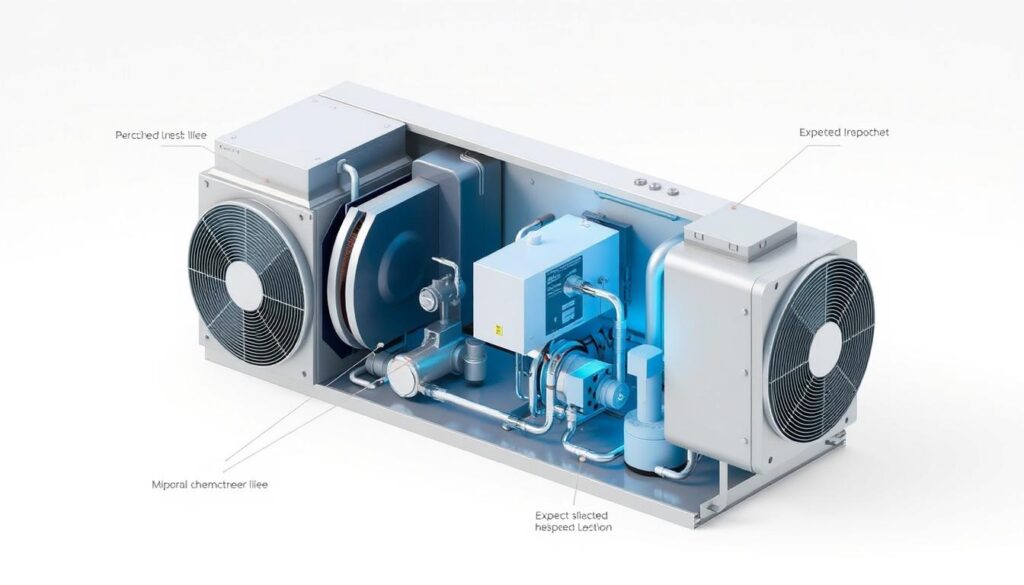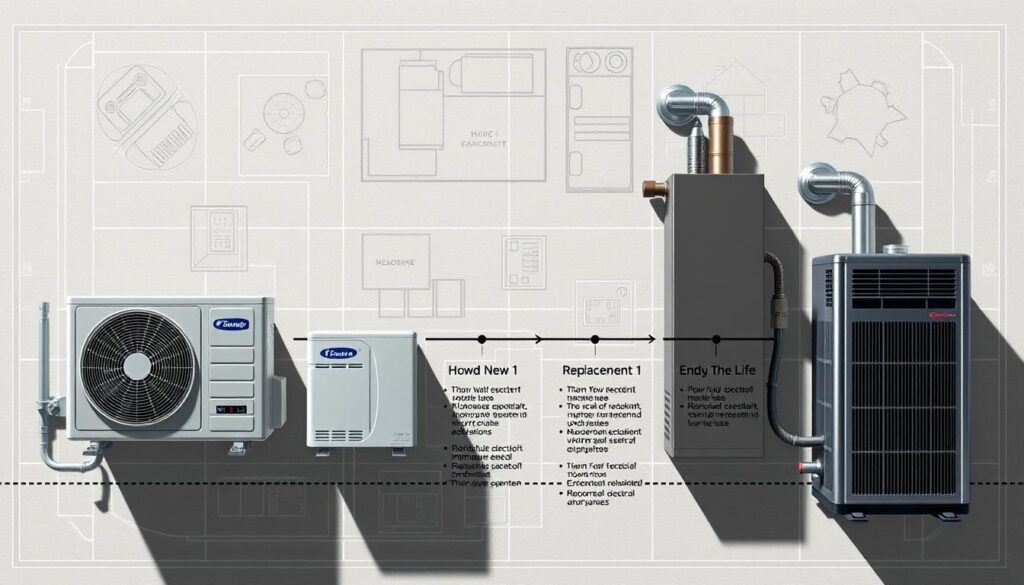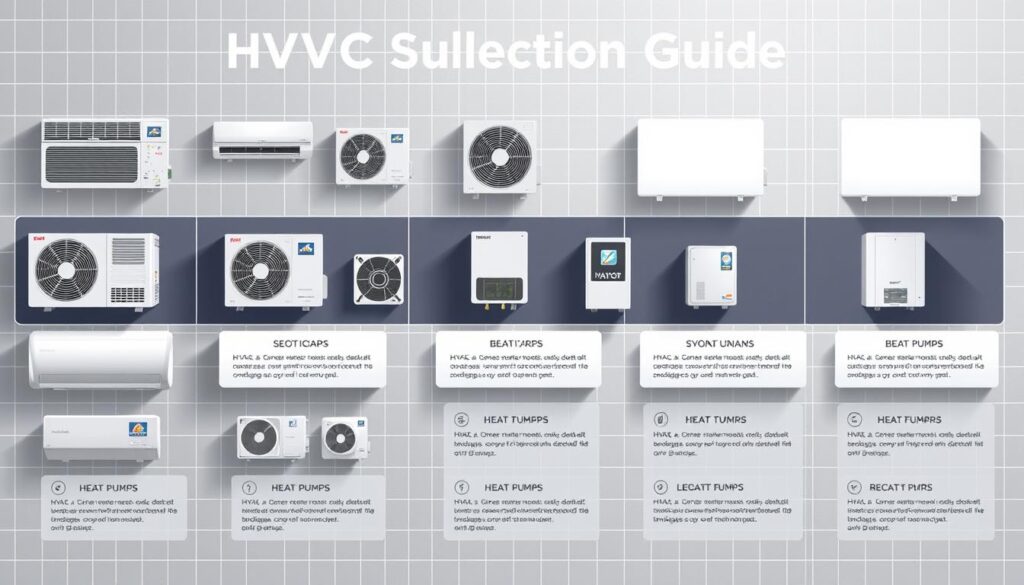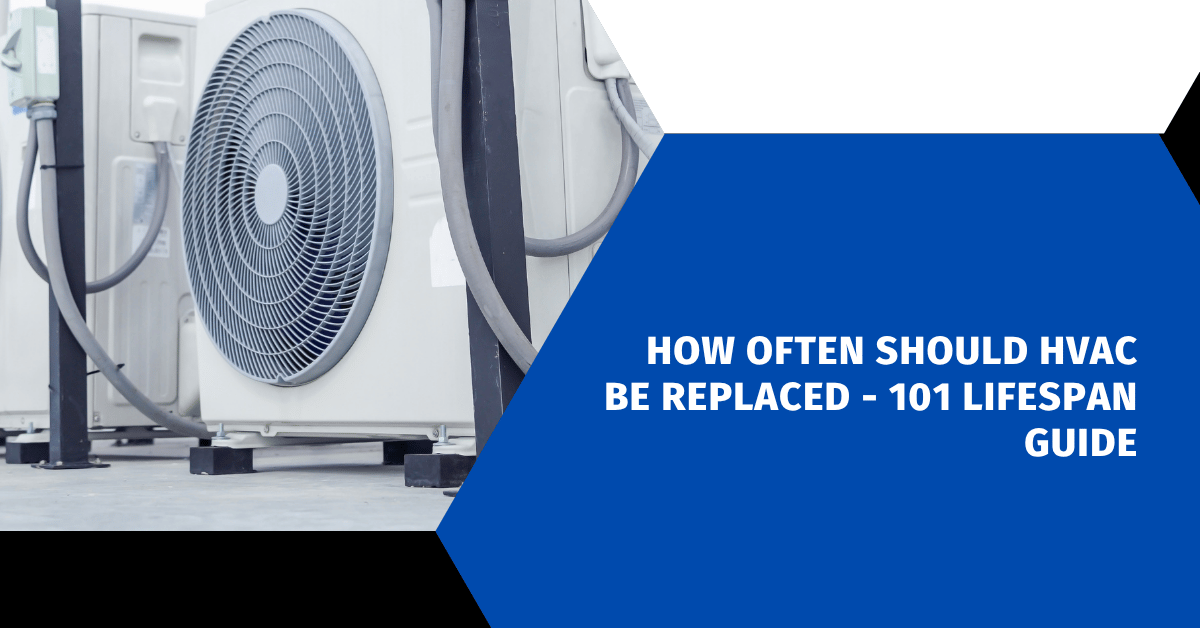Affiliate Disclosure
HVAC Guide Guys is a participant in the Amazon Services LLC Associates Program, an affiliate advertising program designed to provide a means for sites to earn advertising fees by advertising and linking to Amazon.
How Often Should HVAC Be Replaced? Ever think your home’s heating and cooling might be on its last legs? Knowing when to replace your HVAC can avoid sudden failures and high repair costs.

Your HVAC system keeps your home comfy, working quietly all year. Most people only notice it when it breaks. Knowing when to replace it can save you from big bills.
HVAC systems usually last 10-20 years. But, how long yours lasts depends on how well you maintain it, how much you use it, and your environment. Spotting signs of wear can help you plan and make smart choices for your home’s comfort.
Key Takeaways
- HVAC systems typically last 10-20 years
- Regular maintenance extends system lifespan
- Efficiency decreases as systems age
- Early replacement can prevent unexpected breakdowns
- Modern systems offer improved energy efficiency
Table of Contents
Understanding HVAC System Basics and Lifespans
Your home’s comfort depends on a well-functioning HVAC system. Knowing the basics helps you plan for replacements and maintenance.
HVAC systems are complex networks of heating, ventilation, and air conditioning. They keep your living spaces comfortable all year. Knowing how long they last can save you money and time.
Different Types of HVAC Systems
Home comfort systems vary in design and function:
- Central Air Conditioning Systems
- Heat Pumps
- Furnace and Split Systems
- Ductless Mini-Split Systems
- Geothermal Heat Pumps
Average Lifespan Expectations
Different HVAC parts last for different times based on use and care:
| HVAC Component | Average Lifespan |
|---|---|
| Air Conditioners | 15-20 years |
| Furnaces | 15-30 years |
| Heat Pumps | 10-20 years |
| Ductless Mini-Splits | 10-30 years |
Factors Affecting System Longevity
Several factors affect how long your HVAC system lasts:
- Regular maintenance
- Quality of initial installation
- Local climate conditions
- Frequency of use
- System quality and brand
Understanding these factors helps you make smart choices for your home’s heating and cooling. This way, you can plan for replacements and keep your home comfortable and efficient.
Explore Our HVAC Shop
Looking for top-rated HVAC tools, parts, and accessories? Visit our shop and find the perfect solution for your needs.
Visit the ShopSigns Your HVAC System Needs Replacement
Knowing when to replace your HVAC system can prevent unexpected breakdowns and high energy bills. A well-working heating and cooling system keeps your home comfortable. It’s important to recognize the signs that your HVAC needs to be replaced.
Several key indicators suggest it might be time to replace your HVAC system:
- Age of the System: Most HVAC systems last 10-15 years. If your unit is approaching or exceeding this age, replacement becomes more likely.
- Rising Energy Bills: Sudden increases in energy costs can signal that your system is working harder and becoming less efficient.
- Frequent Repairs: When repair costs start adding up, investing in a new system might be more economical.
Performance issues are another critical sign you need a new HVAC system. Listen for unusual noises like grinding, squealing, or banging. These sounds often indicate internal mechanical problems that might be beyond simple repairs.
Uneven heating or cooling throughout your home is another red flag. If some rooms feel significantly warmer or cooler than others, your current system may be failing. Strange odors coming from your vents can also suggest internal problems that might require a complete system replacement.
- Inconsistent temperatures
- Excessive dust or humidity
- Poor air quality
Professional HVAC technicians can provide a detailed assessment to determine if replacement is your best option. They’ll check your system’s overall condition and help you decide when to get new HVAC equipment.
The Impact of Regular Maintenance on HVAC Lifespan
Keeping your HVAC system well-maintained is key to making it last longer and avoiding sudden repairs. Regular upkeep helps homeowners dodge expensive breakdowns and keeps the system running smoothly.
Good maintenance boosts your system’s efficiency and lifespan. Ignoring routine care can lead to faster wear and tear. This can cause costly hvac replacement factors that hurt your wallet.
Essential Maintenance Tasks
- Replace air filters every 1-3 months
- Clean air vents and registers quarterly
- Clear debris around outdoor units
- Check refrigerant levels annually
- Inspect electrical connections
Professional vs DIY Maintenance
Some maintenance tasks are easy to do yourself, but professional inspections are more thorough. Experts can spot issues before they become big problems.
Maintenance Schedule Guidelines
Make a plan for regular maintenance that includes:
- Seasonal professional inspections
- Monthly filter checks
- Biannual complete system checks
Regular maintenance can make your HVAC system last 40% longer and save you a lot on energy costs.
Explore Our HVAC Shop
Looking for top-rated HVAC tools, parts, and accessories? Visit our shop and find the perfect solution for your needs.
Visit the ShopHow Often Should HVAC Be Replaced: A Complete Timeline

Knowing when to replace your HVAC system is key for a cozy and efficient home. Most systems don’t last forever. Replacing them at the right time can save you money and avoid sudden breakdowns.
The lifespan of HVAC systems depends on several factors:
- Central air conditioning units: 10-15 years
- Heat pumps: 10-15 years
- Furnaces: 15-20 years
- Boilers: 15-20 years
To figure out when to replace your HVAC, look out for these signs:
- Age of the system: Most makers suggest replacing after 15-20 years
- More repairs needed
- Higher energy bills
- Uneven heating or cooling
Your HVAC replacement schedule depends on a few things:
- Maintenance quality
- How much you use it
- Your local climate
Regular checks by pros can tell you when it’s time for a new system.
Pro tip: Keep track of your system’s age and how well it works. This way, you can plan for a new one before it fails.
New HVAC tech is more efficient, saving you money over time. Getting a new system can also make your home more comfortable.
Cost Considerations for HVAC Replacement
When planning to replace your HVAC system, you need to think about the cost. The cost can change a lot, based on several factors. Knowing these costs helps you decide on the best upgrade for your home’s heating and cooling.
Price Ranges for Different Systems
The cost to replace your HVAC system varies a lot. It depends on what your home needs. Here are some prices for different systems:
- Central Air Conditioning: $3,500 – $7,500
- Heat Pump Systems: $4,000 – $10,000
- Ductless Mini-Split Systems: $2,000 – $14,500
- Gas Furnace: $2,500 – $6,000
Installation and Labor Expenses
Most of the cost goes to labor, which is 50-70% of the total. Getting a pro to install it right can cost $500 to $2,500. This depends on how complex the system is and where you live.
Return on Investment Analysis
Getting a new HVAC system is a smart long-term choice. New, energy-saving systems can cut your bills by 20-40%. You could save thousands over the system’s life.
Pro tip: Always get multiple quotes and consider energy efficiency ratings when evaluating hvac system replacement cost.
Explore Our HVAC Shop
Looking for top-rated HVAC tools, parts, and accessories? Visit our shop and find the perfect solution for your needs.
Visit the ShopEnergy Efficiency and Modern HVAC Technologies
Modern HVAC technologies have changed how we enjoy home comfort and manage energy. Your HVAC efficiency ratings are key to knowing how much energy your system uses. This affects how much you spend on utility bills. New systems use advanced tech to work better and waste less energy.
When looking at HVAC efficiency ratings, focus on important metrics. The SEER2 rating is a key measure of cooling efficiency. Higher SEER2 ratings mean your system can save more energy.
- SEER2 ratings range from 13 to 26 for residential systems
- Higher ratings mean lower energy consumption
- Modern systems can reduce energy costs by up to 40%
Smart technologies are changing HVAC systems. Features like zoned cooling, programmable thermostats, and advanced sensors improve energy use. These allow you to set temperatures, track energy, and adjust system performance as needed.
| HVAC Technology | Energy Efficiency Impact | Estimated Annual Savings |
|---|---|---|
| Smart Thermostats | 10-15% reduction in energy use | $180-$250 |
| Variable Speed Systems | 20-25% energy efficiency improvement | $300-$450 |
| Zoned HVAC Systems | Up to 30% energy savings | $400-$550 |
Choosing modern HVAC technologies with high efficiency ratings offers big benefits. You’ll cut down on carbon emissions and save on energy bills. Plus, your home will be more comfortable.
The HVAC Replacement Process Explained
Replacing your HVAC system can seem daunting, but knowing the steps helps. It ensures you get a system that fits your home’s needs.
Getting ready for a new HVAC means planning and expert advice. Your journey will cover stages to boost comfort and efficiency.
Pre-Installation Assessment
First, pros assess your home’s needs. This step is key and includes:
- Measuring your home’s square footage
- Evaluating existing ductwork
- Checking insulation quality
- Performing a Manual J load calculation
Installation Day Procedures
On installation day, skilled techs remove your old system. They then prepare for the new one. The steps are:
- Removing the existing equipment
- Cleaning and preparing installation areas
- Installing new system components
- Connecting electrical and refrigerant lines
Post-Installation Checks
After setup, techs do important tests. These checks ensure your system works well. They include:
- Verifying proper airflow
- Checking refrigerant levels
- Testing electrical connections
- Calibrating thermostat settings
“A professional HVAC replacement is an investment in your home’s comfort and energy efficiency.” – HVAC Industry Expert
Knowing each step of the replacement process makes upgrading your HVAC easier. You can do it with confidence and peace of mind.
Explore Our HVAC Shop
Looking for top-rated HVAC tools, parts, and accessories? Visit our shop and find the perfect solution for your needs.
Visit the ShopChoosing the Right HVAC System for Your Home

Choosing the right HVAC system is a big decision. It affects your home’s comfort and how much energy it uses. Your home’s environment is key in picking the best system.
When picking an HVAC system, consider these factors:
- Home square footage
- Local climate conditions
- Energy efficiency ratings
- Budget constraints
- Existing ductwork configuration
Different HVAC systems have their own benefits. Here’s a detailed look at your options:
| System Type | Best For | Efficiency Rating | Cost Range |
|---|---|---|---|
| Central Air Conditioning | Large homes with existing ductwork | 14-20 SEER | $3,000-$7,000 |
| Heat Pump | Moderate climates with mild winters | 15-22 SEER | $4,000-$8,000 |
| Ductless Mini-Split | Smaller spaces, zone cooling | 16-24 SEER | $2,000-$5,000 |
Deciding when to get a new HVAC depends on your needs. Getting professional advice is key. Think about your home’s specific needs, energy savings, and the upfront cost.
Pro Tip: Always request multiple quotes and compare system specifications before making a final decision.
Common Mistakes to Avoid During HVAC Replacement
Replacing your HVAC system is a big deal. It’s a big investment that needs careful thought. Many homeowners make big mistakes during the hvac repair vs replace process. These mistakes can cause expensive problems and make your system less efficient.
One big mistake is picking the wrong system size. A unit that’s too big or too small won’t keep your home at a comfortable temperature. It will also waste energy. A professional HVAC contractor can do a detailed load calculation. This ensures you get the right size for your home.
- Neglecting ductwork inspection before replacement
- Focusing solely on upfront costs instead of long-term efficiency
- Skipping professional assessment of home’s heating and cooling requirements
- Failing to consider energy efficiency ratings
When deciding between hvac repair vs replace, homeowners often make financial mistakes. Cheap isn’t always better. A cheaper system might seem good at first, but it could cost more in energy bills and repairs later on.
Another mistake is ignoring home insulation and air sealing. Even the best HVAC system can’t make up for a poorly insulated home. Adding proper insulation before replacing your system can greatly improve its performance and cut down on energy use.
Proper planning and professional guidance are key to a successful HVAC replacement strategy.
Always hire certified HVAC professionals for a thorough assessment and guidance. Their knowledge will help you avoid costly errors. It ensures your new system works its best.
Explore Our HVAC Shop
Looking for top-rated HVAC tools, parts, and accessories? Visit our shop and find the perfect solution for your needs.
Visit the ShopSafety Considerations and Warranty Information
Keeping your home safe starts with knowing about your HVAC system. An old HVAC unit can be dangerous for your family. It’s important to know when to replace it and what warranty you have.
As your HVAC unit gets older, safety becomes a big concern. Older systems can have serious problems. These problems can put your family’s safety at risk.
- Potential carbon monoxide leaks from cracked heat exchangers
- Electrical hazards from worn-out components
- Reduced air quality due to accumulated dust and mold
- Increased risk of system failures during extreme weather
Warranty protection is key when dealing with an old HVAC unit. Most makers offer warranties for 5-10 years. Here are important things to know about your warranty:
- Check the original installation date
- Review the manufacturer’s warranty terms
- Understand what components are covered
- Verify if regular maintenance is required to maintain warranty
Homeowners should keep records of their HVAC’s maintenance. This is important for warranty claims or deciding when to replace it. Regular maintenance can also prevent safety problems.
Your family’s safety is worth more than saving a few dollars on an aging HVAC system.
Conclusion
Knowing when to replace your HVAC system is key to a cozy home. Your HVAC is a big investment in your home’s comfort and energy use. Keeping track of its age, how well it works, and its maintenance history helps you decide when to upgrade.
Regular upkeep is vital to extend your HVAC’s life. Professional checks, quick fixes, and early care can add years to your system. If you notice wear or a drop in efficiency, it’s time to think about replacing it. This prevents sudden failures and expensive fixes.
Modern HVAC systems are a smart pick for homeowners. They use less energy, work better, and offer more comfort features. Being proactive and knowing your system’s life cycle ensures your home stays warm and cool.
Every HVAC system is different, and when to replace it varies. Talk to professional HVAC techs for advice that fits your system, home needs, and budget.

